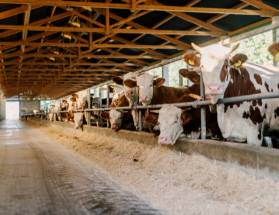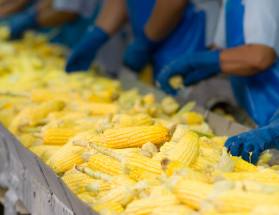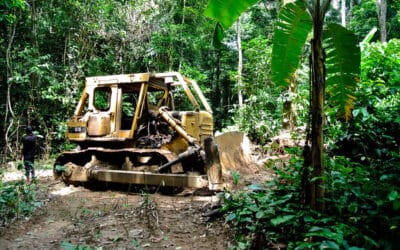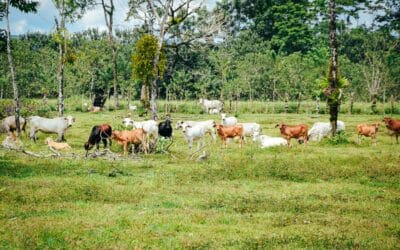By Andrea Echeverri, GFC’s Unsustainable livestock campaign coordinator.
In our collective efforts to combat the multifaceted challenges posed by factory farming, one essential aspect often remains overshadowed: gender justice. While prevailing perceptions might regard issues like hunger and malnutrition, exposure to pesticides, antibiotic resistance, speculation of food, export-oriented food production, eviction of native nutritive food by genetically manipulated crops and environmental degradation as mere remnants of past developmental stages or personal failings, a more nuanced analysis reveals that the problems at hand run deeper.
The world produces enough food to feed the current population and even 1.5 times more, but hundreds of millions suffer from hunger. The misconception that erroneous individual decisions are considered the leading cause of land loss, low wages, economic precariousness, and the dispossession of millions of families in the countryside, with particularly negative impacts for women, along with pollution and deforestation, covers up the fundamental fact that the world does not lack food, but rather has a surplus of injustices. It is not possible to continue thinking of agriculture as a system for reproducing capital rather than for reproducing life. These injustices are painted as market failures, correctable with greater access to information or technological innovation, such as Climate Smart Agriculture.
Although, undoubtedly, personal decisions and access to information are unavoidable to build a better world, in the systemic structure of the food system, individual actions are insufficient to transform hunger, disease, poverty and environmental destruction. The narrative that emphasises individual decisions and technology as the sole correctives fails to account for the systemic structures entrenched in the food system. The agrifood system is intricately woven with social class, gender, and ethnicity, perpetuating a matrix of capitalist, patriarchal, and colonial dominance that underlies unequal access to sustenance, safe working conditions, and a healthy environment. Rather than helping chart a path to a just and equitable future, this false and pernicious narrative keeps us chained to historical injustices.
The world does not lack food, but rather has a surplus of injustices
Delving into the patriarchal dimension of the globalized agri-food system is a requisite endeavour; as Vandana Shiva aptly observes, “From seed to table, the entire food chain is gendered.” This perspective urges us to view gender not as individual identities but as a “system structuring unequal power relations, distribution, voice, and rights,” as articulated in a recent publication by the Third World Network.
Historically, in the sexual division of labour, food production has fallen mainly on women, who have harvested, cooked, processed, and served food from practices of care and diversity; however, women’s food economy has not been recognised as productive work and patriarchal domination that has been configured for millennia, but has been refined with the advance of corporate power, has denied them access to the means and resources to continue reproducing seeds, knowledge and food itself. These redefinitions have also undermined women’s agency and their ability to be involved in decision-making processes, leadership roles and promote collective action. Understanding that women’s struggles are not unilateral, but rather intersect systems of inequality based on gender identity, age, ethnicity, class and other forms of discrimination, is fundamental to design effective public and mitigation policies in line with the current reality.
While women play an instrumental role in producing 50% of the world’s food, their ownership of land remains at a mere 2%. This gender-based disparity becomes glaringly evident in the statistics related to hunger and malnutrition. A gendered divide is underscored by the fact that women constitute the majority among those suffering from hunger, outnumbering men by 150 million in 2021. Moreover, in animal husbandry, women own fewer animals, and usually small animals such as pigs or poultry. This skew not only robs them of economic empowerment but also aggravates global hunger. The Food and Agriculture Organization (FAO) posits that granting rural women equitable access to resources would feed an additional 150 million people.
The intertwining threads of patriarchal capitalism, corporate control, unlimited growth and ecological degradation have fostered an unsustainable and unjust food system. The intensive livestock model usurps land and water that should be used to feed impoverished communities.
Since women’s land has been more agrobiodiverse; denying women access to land erodes the basis of life. Historically, humanity has consumed over 8,000 plants, 3,000 of them regularly, many of them due to women’s interactions with them. The corporate agri-food system strips traditional knowledge and privatises it; it pushes economic, political, and cultural agendas that would be unthinkable without a patriarchal underpinning. In the face of women’s economies that have thought in terms of food, the agri-food system thinks in terms of commodities.

The gravity of the gendered dimensions within the agri-food system cannot be understated. The intertwining threads of patriarchal capitalism, corporate control, unlimited growth and ecological degradation have fostered an unsustainable and unjust food system. The intensive livestock model usurps land and water that should be used to feed impoverished communities. This model, often justified as an alternative to address food insecurity, is intensifying the problem, as it consumes more food than it generates. Factory farming reinforces systemic practices of exclusion and exacerbates the oppression of women, as the following examples illustrate.
Intensification of domestic and sexual violence: Studies have shown that employment in slaughterhouses (a masculinised job) can generate post-traumatic stress disorder. A groundbreaking quantitative empirical research identified that this job, when compared with others, has higher rates of arrests for violent crimes and sexual offences. Women and girls in all their diversity experience increased domestic and sexual abuse by men with these jobs.
Climate injustices: Livestock accounts for up to 19.6% of global greenhouse gas emissions. The climate crisis has clearly differentiated impacts, and much could be said about it. According to the UN Environment Program (UNEP), approximately 80% of people displaced by climate change are women and girls. In the shelters and camps where they arrive, they are more exposed to sexual violence while they sleep, bathe, or carry out their daily activities.
Other differentiated impacts of the climate crisis include reduced access to food, increased time and distance spent in fetching water, nourishment or medicines, leading to increased risk of sexual violence, and increased school dropout rates. While we can make other inferences from this data, those mentioned above demonstrate how injustices intersect and intensify if not addressed holistically.

Public health: The World Health Organisation (WHO) recognises gender as a determining factor in health inequalities. Since women have higher rates of malnutrition, their immune systems are often weakened, and they are prone to develop non-communicable diseases linked to zoonosis, pesticides, hormones, and other risks to which they are exposed in communities affected by intensive cattle ranching or monoculture projects.
These impacts are only indicative, since all aspects of social life are permeated by gender, and this does not exclude current food trends. The corporate agrifood system encourages monocultures because they control more, not because they produce more or better; this implies greater subjugation of women, racialised and impoverished peoples, local communities and Indigenous peoples, and, in many cases, these injustices intersect and deepen.
The food system concentrated around the expansion of unsustainable forms and intensive livestock farming is unjust and unviable but not undefeatable. Understanding the structural conditions and struggles of those most vulnerable in the entire chain of the current food system is essential to understand the profound need for change and identify possible pathways to solutions. This imperative extends beyond rectifying immediate inequalities—it involves a radical rethinking of power dynamics, resource distribution, and societal values.
In this sense, overcoming intensive livestock farming, a concentrated expression of patriarchal capitalism, and moving towards sustainable and just food systems necessarily implies gender justice. It means a feminist struggle.
Embracing a feminist perspective as a driving force in reshaping our food systems is not only ethical but also pragmatic. By disentangling the deeply ingrained structures of patriarchy and capitalism, we pave the way for a sustainable, just, and equitable future. To create a nourished, balanced world, we must embrace a comprehensive paradigm shift—one that empowers women, safeguards biodiversity, and upholds the rights of all.





